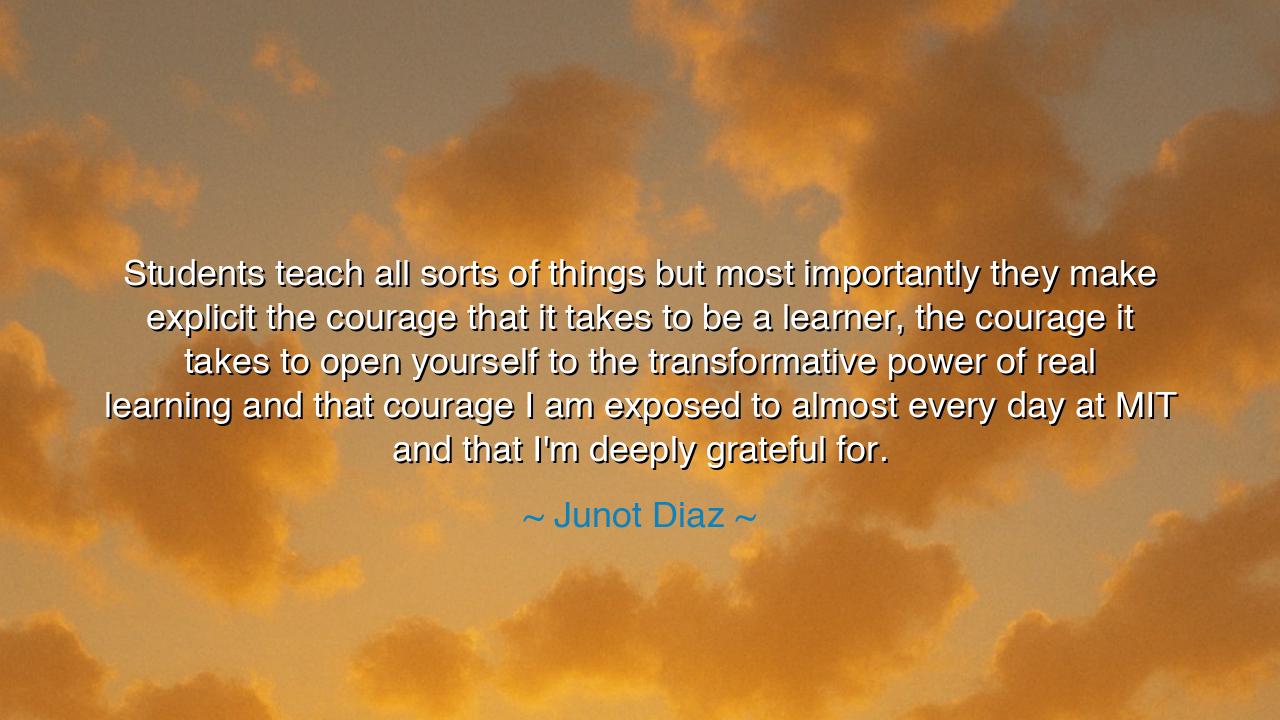
Students teach all sorts of things but most importantly they make
Students teach all sorts of things but most importantly they make explicit the courage that it takes to be a learner, the courage it takes to open yourself to the transformative power of real learning and that courage I am exposed to almost every day at MIT and that I'm deeply grateful for.






The writer Junot Díaz, in his reflection—“Students teach all sorts of things but most importantly they make explicit the courage that it takes to be a learner, the courage it takes to open yourself to the transformative power of real learning and that courage I am exposed to almost every day at MIT and that I’m deeply grateful for”—speaks of a truth as old as humanity itself: that learning is an act of courage. It is not merely the gathering of knowledge, nor the memorization of facts, but a sacred surrender of the self to transformation. To learn deeply is to die a little to who you were, so that you may rise anew in wisdom.
In the halls of MIT, where Díaz witnesses this courage, young minds wrestle not only with equations or experiments, but with their own limits—their fears of failure, their doubts about worthiness, their longing to understand a world greater than themselves. What Díaz calls “the courage of the learner” is no ordinary bravery. It is the quiet, invisible valor of those who risk being changed by what they do not yet understand. True learning demands vulnerability—it asks the heart to unclench, the mind to humble itself, and the ego to bow before mystery.
The ancients knew this well. In the Delphic temple, inscribed upon the stone of time, were the words “Know thyself.” Yet to know oneself is the most perilous of journeys. The philosopher Socrates, who spent his life in pursuit of this inner knowledge, was condemned for his questions. His courage lay not in defiance, but in his willingness to unlearn, to challenge illusion, and to let wisdom reshape his soul. Like the students Díaz honors, Socrates understood that every act of learning is an act of becoming—sometimes painful, often uncertain, but always divine.
And what is this transformative power of real learning that Díaz speaks of? It is the alchemy that turns ignorance into insight, despair into wonder, and limitation into growth. It is the same force that moved Helen Keller, born blind and deaf, to learn the language of touch, to feel words in the water, and to speak to the world through the voice of her spirit. Her teacher, Anne Sullivan, did not simply instruct her; she helped her discover the courage to open herself to transformation. Keller’s life became a living testament to the truth Díaz proclaims: that teaching and learning are mirrors reflecting the sacred bravery within the human heart.
The teacher, too, is a learner, and Díaz’s words echo with gratitude for this eternal exchange. He reminds us that teachers do not stand above their students—they walk beside them. Every time a student dares to fail and rise again, the teacher witnesses the essence of courage. In that shared vulnerability, learning becomes not a transaction, but a communion of souls. Thus, the act of teaching is sanctified—not by authority, but by empathy, humility, and awe before the learner’s journey.
In a world obsessed with certainty, Díaz’s insight is a call to reverence for uncertainty. The greatest discoveries—scientific or spiritual—are born from those who are unafraid to ask, “What if I am wrong?” To be a true learner is to stand at the edge of the known and gaze into the abyss of the unknown, trusting that even in confusion, something within you is expanding toward truth. Such courage is not loud—it does not wear armor or shout victory. It is the quiet bravery of a mind that refuses to close itself off from growth.
So, let all who hear this teaching remember: to learn is to live twice. Once in ignorance, and again in awakening. The wise do not seek comfort in what they already know; they seek discomfort in the service of becoming. The path of the learner is the path of the hero—not because it conquers others, but because it conquers the self.
Therefore, walk forward each day with the courage to be a learner. Question your certainties. Welcome the discomfort of change. Speak less to prove, and listen more to grow. For in the classroom of life, every humble heart is both teacher and student, and those who open themselves to the fire of learning shall emerge—transformed, renewed, and free.






AAdministratorAdministrator
Welcome, honored guests. Please leave a comment, we will respond soon